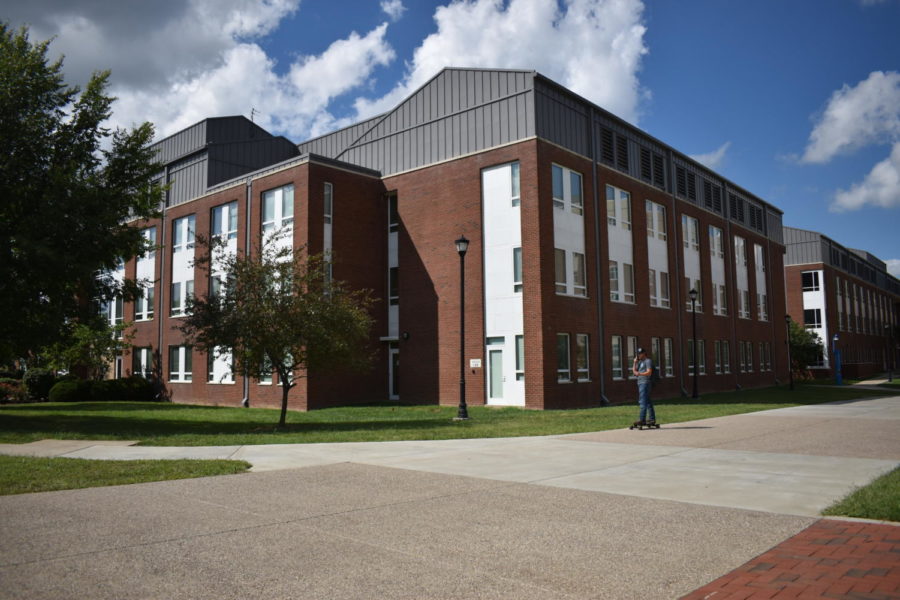OVERWHELMED: On-campus housing process reveals cracks in UK’s infrastructure
Ingels Hall casts a shadow on Tuesday, Aug. 30, 2022, at University of Kentucky in Lexington, Kentucky. Photo by Abbey Cutrer | Kentucky Kernel
September 4, 2022
An influx of 6,000 incoming students left UK Housing in a sticky situation when looking at the students-to-beds ratio.
Troubles began when the UK Housing portal window opened on June 13 for the 2022-2023 school year room selection. Some rooms were deemed unavailable when open spaces remained in the other bedroom(s), as well as no rooms being available at the time, according to the UK Housing website.
In order to temporarily resolve the problem, students and families were contacted with information that housing would work directly with those still awaiting a room assignment, UK spokesperson Jay Blanton said.
Students were no longer able to access the portal and would be contacted, along with guaranteed a room assignment for fall 2022, if their attendance was confirmed by June 1 in addition to having a housing application on file.
“To ensure that we are moving as quickly as possible, we temporarily disabled the online room selection tool,” Blanton said. “Our campus housing office is manually assigning rooms based on the student’s date of application.”
Returning students who completed the application after the May 3 deadline could not be promised a housing assignment due to the capacity restraints. Requests were fulfilled as space permitted.
Despite having over 7,000 beds on campus and no requirement for students to live on-campus, nearly 88-90% choose to live on campus, president Eli Capilouto told the Kernel during an interview.
“This is a choice of our students, and I love hearing that. Students who live on campus tend to do better,” Capilouto said. “They enjoy easy access to classrooms, dining, other amenities, the Study, working with fellow students on projects is easier and all. So we have space, if need to, we can consider more space in the future.”
Nonetheless, the problem is far from solved for the current school year. Freshman Bre Humphrey and residential advisor [RA] Gracie Keown were placed in a two-person suite together in Chellgren Hall, sharing a bathroom and common area but having their own bedrooms.
Humphrey was not able to get a housing assignment before the deadline closed and began looking at off-campus housing. She was later notified at the end of July she was given a room in Chellgren Hall.
“It was the end of July, and I still didn’t have housing. So my parents and I, we were looking at the Hub and off-campus, and then all of a sudden I got an email and they were like, ‘Yeah, you have housing, and it’s at Chellgren,’ and I had no idea where it was at,” Humphrey said.
Humphrey said she reached out to Keown through the given email and began contacting and texting about the basic move in details, but did not know she was rooming with a RA until Keown told her. Keown however was notified by Residential Life [Res-Life] shortly before move-in of the situation.
“I think that while the intention was good, I am robbing my roommate of her freshman year experience,” Keown said. “She was stripped of the opportunity to live and grow with a fellow freshman.”
Humphrey said she sees it as a friendship rather than a resident-to-RA friendship, but has not been able to meet many freshmen in the hall.
Junior RA Louis Baser also shares a room with a resident in Woodland Glen V. Baser was originally supposed to live with another RA but was told the first week of August it was being changed to a resident. Baser said the resident was not informed of the living situation.
Baser said that there is not a time to separate work from his private life in the matter that he works where he lives.
“Personally, this seems like an unethical arrangement and power dynamic because there is not a single place in the entire building where I am not working,” Baser said.
Unlike Keown and Humphrey, Baser is finding himself dissatisfied with his living and workplace in that he is now quitting from the position.
“As a student at the University of Kentucky within the office of Res-Life, we were consistently told that we were ‘People first, students seconds and RAs third,’” Baser said. “However, the second there was the slight need of the job, Res-Life continuously decides to no longer care for or support their employees in every facet.”
In addition to having to work almost 40 hours a week (exceeding the mandatory four hours for the position), work night shifts and room with a resident, Baser said he no longer finds the position worth it. He said he also feels Res-Life disregards the mental health and well-being of their RAs.
“Unless free housing is a necessity, as it was for me, I would encourage you to not apply for the RA position because your mental health is bound to suffer,” Baser said.
Besides the resident-to-RA living situation, other residents are living in converted RA rooms. These rooms consist of a smaller living space, two twin beds in replace of the original full-XL and a smaller sink and vanity according to Keown.
“These rooms have no walls separating the beds and is basically a large shared living space with a bathroom,” Keown said.
Keown has two of her residents sharing one of the converted spaces but says the “honeymoon phase” is still in effect, and conflicts have been minimal.



























































































































































